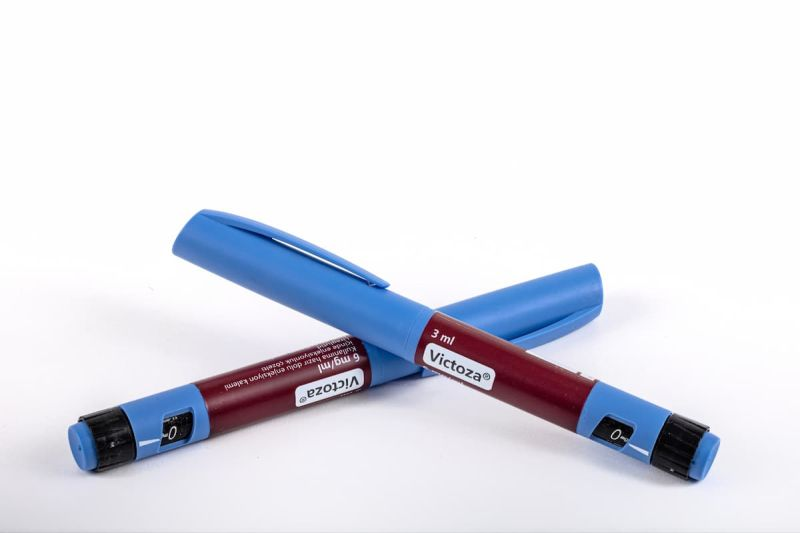Victoza Injection is a medication used to manage type 2 diabetes and aid. This injectable medication has become a trusted option for improving blood sugar control while offering additional health benefits.

What is Victoza?
Victoza is a glucagon-like peptide-1 receptor agonist. It mimics the action of a natural hormone that helps regulate blood sugar levels, appetite, and digestion. Victoza is administered as a once-daily subcutaneous injection, making it convenient and effective for long-term diabetes management.
Victoza Injection Uses
- Management of Type 2 Diabetes:
- Victoza helps lower blood sugar levels by stimulating insulin secretion, reducing glucagon release, and slowing stomach emptying. It’s used alongside diet and exercise to improve blood sugar control.
- Weight Management (Off-label):
- Victoza may also be prescribed for weight loss in individuals with type 2 diabetes or obesity. By reducing appetite and calorie intake, it supports gradual and sustained weight loss.
- Cardiovascular Benefits:
- Studies have shown that Victoza can reduce the risk of major cardiovascular events, such as heart attack and stroke, in patients with type 2 diabetes and heart disease.
Effects of Victoza
- Common Side Effects:
- Nausea, vomiting, diarrhea, constipation, and decreased appetite.
- Serious Side Effects:
- Pancreatitis, gallbladder problems, kidney issues, or severe allergic reactions.
Precautions
1. Consult Your Healthcare Provider
Before starting Victoza, always consult with your healthcare provider. Inform them about any existing medical conditions, particularly:
- Kidney or liver problems
- Heart disease or history of heart attacks
- Pancreatitis (inflammation of the pancreas)
- Thyroid conditions
2. Proper Injection Technique
Ensure you receive proper training on how to inject Victoza. Some key tips include:
- Inject once daily as prescribed.
- Administer the injection subcutaneously (under the skin), typically in the thigh, abdomen, or upper arm.
- Do not inject into a vein or muscle.
3. Monitor for Allergic Reactions
Although rare, some users may experience allergic reactions to Victoza. Be aware of symptoms such as:
- Rash, itching, or swelling.
- Difficulty breathing or swallowing.
- Severe dizziness or lightheadedness.
If any of these occur, seek medical help immediately.
4. Regular Blood Sugar Monitoring
People using Victoza for type 2 diabetes should monitor their blood sugar levels regularly. This helps to adjust the medication dosage and avoid complications such as hypoglycemia (low blood sugar).
5. Avoid Alcohol Consumption
Alcohol can increase the risk of developing hypoglycemia (low blood sugar) when using Victoza. Limit or avoid alcohol consumption while on this medication.
6. Be Aware of Gastrointestinal Side Effects
Some common side effects of Victoza include:
- Nausea, vomiting, or diarrhea.
- Abdominal pain or indigestion. These side effects often improve as the body adjusts to the medication, but consult your doctor if they persist.
7. Kidney Function Monitoring
Victoza may affect kidney function, especially if you have pre-existing kidney issues. Regular kidney function tests are recommended while using this medication to detect any potential problems early.
FAQs About Victoza
Who can use Victoza?
- Victoza is approved for adults and children aged 10 years or older with type 2 diabetes. It may also be prescribed off-label for weight management.
2. Can Victoza cause low blood sugar?
- Victoza alone has a low risk of hypoglycemia (low blood sugar). However, combining it with other diabetes medications like insulin may increase the risk.
3. How long does it take for Victoza to work?
- Many patients notice improvements in blood sugar control and appetite within the first few weeks of starting Victoza.
4. Is Victoza covered by insurance?
- Coverage varies depending on your insurance plan. Check with your provider for details about costs and reimbursement.
5. Can Victoza be used for type 1 diabetes?
- No, Victoza is not approved for the treatment of type 1 diabetes.
if you have any question you can contact us!
The information on this page is merely supplemental. The information provided here is not intended to replace the counsel of a licensed physician. This page does not recommend that using this medication is appropriate or safe. Therefore, before taking this medication or any other medication, it is recommended that you consult your doctor.
Also read: Cymbalta Uses, Effects, and Precautions a Complete Guide

